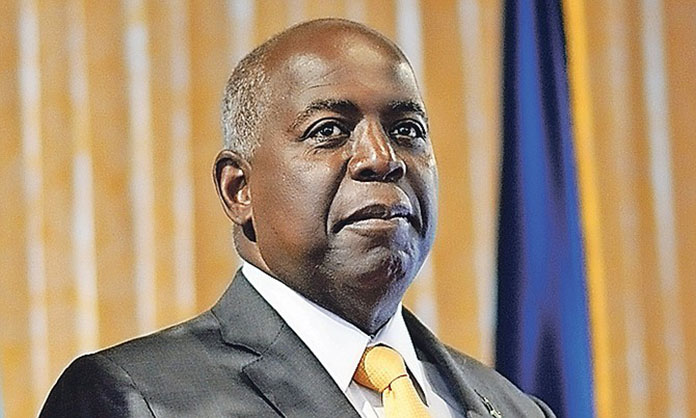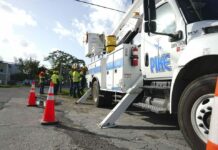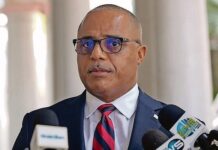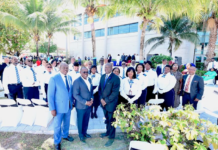National Statement by the Hon. Philip Davis, KC, MP, Prime Minister of the Commonwealth of The Bahamas

Fellow Bahamians:
Today, I wish to provide an update on the significant steps we are taking to protect our borders and our national security, in light of the very serious situation in Haiti.
As many Bahamians are aware, armed gangs in Haiti have attacked critical infrastructure there, including the airport. There has been a collapse of law and order in many areas of the country, and a serious humanitarian crisis is unfolding.
I know the Bahamian people join me in praying for the many innocent souls who are caught up in the terrible violence and suffering.
Unfortunately, there are no simple or easy solutions for Haiti, and the country’s disorder and instability pose a security challenge for the entire region.
In The Bahamas, we must patrol thousands of square miles of water in order to protect our nation’s borders.
Since we came to office two and a half years ago, our government has made significant investments in the Royal Bahamas Defence Force.
We have recruited and trained hundreds of new officers, we have expanded our fleet, we have added new technology and equipment, and we built a new facility in Inagua to facilitate faster processing and repatriation of migrants found in our waters.
We have also worked hard to strengthen relationships and cooperation with numerous international partners, so that we are well-positioned to coordinate efforts and resources.
We are now deploying significant RBDF assets to establish a southern Bahamas blockade operation, including surface vessels, aircraft, and 120 highly trained RBDF personnel. Operations will focus on the northern coast of Haiti, the Old Bahama Channel, and the Windward Passage.
As we expand our patrols in our southern waters, the United States and the United Kingdom are also working to position assets in the region. We are working with the US Coast Guard, with Turks and Caicos, and with the Cuban Border Patrol, to share critical intelligence and align our efforts.
Through these collaborative efforts, we have successfully intercepted a number of vessels originating from Haiti. The repatriation of individuals aboard those vessels will be conducted in a manner that prioritizes the safety of our officers and respects the human rights and dignity of the passengers.
At the Summit of Americas in June of 2022, which took place in the United States, twenty-one countries in our hemisphere signed an agreement that included a commitment to receive refugees. I did not sign this pledge, and I continue to believe this is the right decision for our country.
We Bahamians are a compassionate people, but we simply cannot absorb additional burdens or security risks at home.
However, we are committed to continuing diplomatic support for Haitian efforts to create a path forward out of their crisis. Progress is urgently needed — for the people of Haiti, and for the security of The Bahamas and the region.
Earlier this week, I worked with my fellow CARICOM leaders to construct a framework for resolving the political impasse in Haiti. The proposed framework reflects intensive discussions with – and input from – representatives of Haiti’s political factions, civil society coalitions, religious leaders, the diaspora, and the private sector. The dialogue with Haitian stakeholders was facilitated by the CARICOM-appointed Eminent Persons Group, that included our ex-Prime Minister Christie, who contributed significantly to opening channels of communication and advancing understanding.
The first step in the framework is a transitional council, with members chosen by Haitian stakeholders. Haiti’s Prime Minister Ariel Henry has pledged to resign once the council is formed, and the council would appoint an interim Prime Minister.
As the transitional council works to prepare a path to free and fair elections, a Multinational Security Support Mission, authorized by the United Nations last year, may be formed to reinforce the Haitian National Police in creating the conditions necessary to support humanitarian assistance and safe, secure elections.
As many of you know, Kenya has offered to lead this mission, and a number of other nations have offered to send officers, equipment, and resources. Because stabilizing Haiti is critical to preventing a mass migration crisis, and thus critical to our own country’s national security, The Bahamas may send a contingent of officers to participate in maritime operations in support of the multinational force.
Some Bahamians will recall that under Prime Minister Ingraham, Bahamian officers participated in a mission to uphold security in Haiti, in 1994. If the multinational force is deployed this year, and if we able to come to agreement on the parameters of our participation, our Defence Force officers who participate would be restricted to maritime operations, where the RBDF’s experience, expertise and excellence will be a tremendous asset.
The crisis in Haiti is complex and multi-dimensional. While there have been some positive developments, formidable obstacles remain, and the situation remains fluid.
I want to reassure Bahamians that in all contingencies, we are prepared to defend and protect our borders.
To the brave Bahamian men and women in uniform who defend and protect our country – you are the bedrock of our nation’s sovereignty.
We pray for God’s blessings for all those who suffer, and for all those working to alleviate suffering.
Thank you, and may God Bless The Bahamas.







